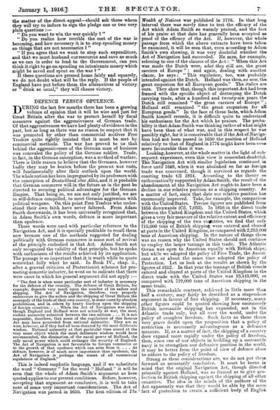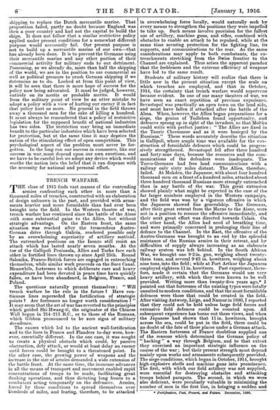DEFENCE VERSUS OPULENCE.
that German commerce the future- as in the past be directed. to securing political advantages for the .German. Empire. That being so, we are not. only justified,. we are in self-defence compelled,. o meet German aggression with • politicalweapons. On. this point -Free. Traders who under- stand their own,. faith have never faltered. From Adam Smith downwards,, it has been universally recognized. that, in Adam Smith's own words, defence is more important than. opulence. Those words were used with particular reference to the Navigation Act, and it is. specially profitable to reeall.them now because one of the.- methods suggested for dealing politically with German commerce is some sort of revival of- the principle embodied in that. Act. Adam Smith not only recognized the validity of that principle, but,he spoke with enthusiasm of the results achieved by its application. The passage is so important that it is worth while to quote somewhat. fully what he said. In Book IV., chap. after a general criticism. of Protectionist schemes for pro- moting domestic industry, he•went on to indicate that there were cases to which, his general.argument did not apply :— " The first is when some particular sort of industry is necessary for the defence of the country. The defence of Great Britain, for example, depends very much upon the number of its sailors and shipping. The Act of Navigation, therefore,. very properly endeavours to give the sailors and, the 'shipping of Great Britain the monopoly of the trade.of their own country, in some eases by absolute prohibitions, and- in. others by, heavy burdens upon the shipping of foreign countries. -. . . When. the Act of , Navigation was made, though. England and Holland • were not actually at -war, the most violent animosity subsisted between the. two mations: . . . It is •not impossible, therefore,. that some. of the: regulations of this famous Act may. have. proceeded from national anunosity. They are as wise, however, as if they had all been diotated by the most deliberate wisdom. National-animosity at that particular time aimed at the very same object which the most deliberate wisdom- would have recommended, the diminution: of the naval power of -Holland, the only naval power -which could endanger the. security of Englanda The Act of Navigation is not favourable to foreign commerce or to the growth of that -opulence which can. arise from it. . . . As defence; however, is of much more -importance than- opulence, the. Act of Navigation: is perhaps; the wisest of all commercial regulations of England."
This..is indeed emphatic language, and if we substitute the word " Germany ' for the word " Holland.," it will be seen that the: whole of -Adam-Smith's: argument as here • quotedappliesto.our present conditions. Before, however, accepting that argument as'. conclusive, it. is well to take note of some very important. considerations. The Act of Navigation was passed. in 1650. The first .edition, of The Wealth of Nations was published in 1776._ In, that long interval there was surely time to test the efficacy of the Act which Adam Smith so warmly praised,. and the fact of his praise- at that date has generally been accepted as proof of the efficacy of the Act. If, however' the whole passage from which the above extracts have. been- takea- be examined; it will be seen that, even according to Adam. Smith's own showing, it was very doubtful whether the Act of Navigation had, succeeded. He says, for example, referring to one of the clauses of the Act When this Act was made the Dutch were, what they still are, the great carriers of Europe " ; and again, dealing with. another clause, he says : " This regulation, too, was. probably: intended against the Dutch, Holland was theraaaa now, the great emporium for all European, goods:" Theitalics are ours: They show that, though this unportantAct hadbeeit framed with the specific object of destroying: the Dutch carrying trade, after a hundred: and twenty-she years: the Dutch still. remained " the great carriers of Europe ".- Holland still' remained " the great emporium, for aU European goods." In the face of. these faeta,,which Adam Smith himself records, it is difficult quite to understand his enthusiasm for. the Act which he praises: The proba- bility is that Adam Smith was thinking rather of what might have been than. of what was, and in this respect he was possibly right, for it is conceivable that if the Act Naviga- tion had. not been passed in 1650 the position of Holland relatively to that- of England in 1776 might have been-even more favourable than it was.
Looking, however, at the whole matter in the light of. sub- sequent: experience, even this view is somewhat doubtful, The Navigation Act with similar legislation continued in force until 1849,, when it was abolished .so far as foreign trade was concerned, though it survived as regards the coasting trade till 1854. According to the theory so enthusiastically supported, by Adam Smith; the result of the abaindonment.ad the. Navigation Act ought, to. have:been a decline in our relative position. as a shipping country. As a matter of fact, since that. date our relative position has enormously improved. Take, for example, the comparison with the United. States. Precise figures are published from 1856 downwards (Cd. 7,033). In 1856,in the direct trade between the United Kingdom -and the United States, which gives-a very fair measure :of the relative extent and efficiency of. the shipping- of the. two conntries, we find. that only 715,000 tons of. British shipping were entered and cleared at ports in-the United Kingdom, as compared with 2,253,000 tons of. American. shipping. In the nature of things there was no reason why the United States should: not. continue to employ. the larger tonnage in this trade. The Atlantic Ocean was. open to American equally with. British ships; but while we adopted. the policy of Free Trade, the Ameri- cans at or about the. same time adopted the policy of Protection. Let us look at the results as shown by the figures of 1912.. In that year the tonnage of British vessels entered and cleared at ports of the United-Kingdom in the direct trade with, the United States was 13,145,000,- as compared with 719,000 tons of American shipping in the same trade. halfThis remarkable contrast; achieved in little more than half a century, may fairly be described as a stupendous argument in.fivour of free shipping. If neCessary,many other figures could be quoted showing bow enormously British. mercantile shipping has expanded, not in the Atlantic trade only, but all over the world, under the policy of, complete freedom. Such facts as these throw very grave doubt upon the proposition that a policy of restriction is necessarily advantageous as a defensive measure. If, as a matter of fact, the shipping of a country does expand; more rapidly under the policy of freedom, then, since one. of our objects in building up a mercantile navy is to strengthen. our defensive position in .the world, it may be better from the point of view of defence alone to adhere to the policy of freedom. Strong as these considerations arc, we do not put them forward. as necessarily conclusive. It must be borne in mind that the original Navigation Act, though directed primarily. against Holland, was so framed as to give pro- tection to British shipping against the shipping of all. other countries. The idea in the minds of the authors of the Act apparently was. that they would be able by the mere fact of protection. to create a sufficient body of. English shipping to replace the Dutch mercantile marine. That proposition failed, partly no doubt because England was then a poor country and had not the capital to build the ships. It does not follow that a similar restrictive policy applied under present conditions for a somewhat different purpose would necessarily fail. Our present purpose is not to build up a mercantile marine of our own—that has already been done. It is to prevent the Germans using their mercantile marine and any other portion of their commercial activity for military ends to our detriment. Possessing, as we already do, more than half the shipping of the world, we are in the position to use commercial as well as political pressure to crush German shipping if we determine so to do. Looked at from this point of view, it will be seen that there is more hope of success for the policy now being advocated. It must be judged, however, entirely on its merits or probable merits. It would from the military. point of view be an utter mistake to adopt a policy with a view of hurting our enemy if in fact that policy hurt us more. No general in the field throws away a thousand men for the sake of killing a hundred. It must always be remembered that a policy of restrictive legislation for the supposed benefit of national industries has two sides. The restriction may bring an immediate benefit to the particular industries which have been selected for protection, but at the same time it may deprive the nation of the stimulating effect of open competition. This psychological aspect of the problem must never be for- gotten. In the long run our success in commerce, like our success in war, must depend upon our own exertions, and we have to be careful lest we adopt any device which would soothe the nation into the belief that it can dispense with the-necessity for national and personal effort.











































 Previous page
Previous page